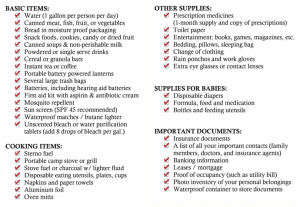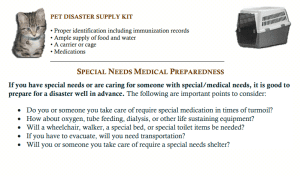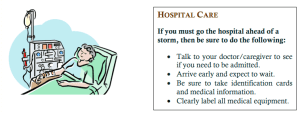|
Getting your Trinity Audio player ready...
|
Every family in West Park should be prepared to be self-sufficient for the first three to five days after a major storm so recovery efforts can be focused on those who cannot help themselves.
FAMILY PREPAREDNESS PLAN
Discuss the hazards that may affect your family. Know your home’s vulnerability to storm surge, flooding and wind. Also, discuss the following:
- Locate a safe room or the safest areas in your home for each hurricane hazard. In certain circumstances the safest areas may not be your home but within your community.
- Determine escape routes from your home and places to meet. These should be measured in tens of miles rather than hundreds of miles.
- Have an out-of-state friend as a family contact, so all your family members have a single point of contact.
- Make a plan now for what to do with your pets, if you need to evacuate.
- Post emergency telephone numbers by your phones and make sure your children know how and when to call 911.
- Check your insurance coverage – flood damage is not usually covered by homeowners’ insurance.
- GET CASH. Banks and ATMs do not operate without electricity in the aftermath of a major storm.
- GET GAS. Gas pumps do not operate without electricity in the aftermath of a major storm.
EMERGENCY SUPPLIES/KIT (3-5 DAY SUPPLY)

Pet Safety and Preparedness
Contact your veterinarian or local humane society for information on preparing your pets for an emergency. You may also consider the following tips:
- Make sure your pets are current on their vaccinations. Pet shelters may require proof of vaccines.
- Have a current photograph of your pet(s).
- Keep a collar with identification on your pet and have a leash on hand to control your pet.
- Have a properly-sized pet carrier for each animal – carriers should be large enough for the animal to stand and turn around.
- Plan your evacuation strategy and don’t forget your pet! Specialized pet shelters, animal control shelters, veterinary clinics and friends and relatives out of harm’s way are ALL potential refuges for your pet during a disaster.
If you plan to shelter your pet – work it into your evacuation route planning. Animals brought to a pet shelter are required to have the following:
- Proper identification collar and rabies tag, proper identification on all belongings
- A carrier or cage
- A leash
- Ample supply of food, water and food bowls
- Any necessary medications, specific care instructions and newspapers or trash bags for clean- up.
- Pet shelters will be filled on first come, first served basis. Call ahead and determine availability. After the storm, walk pets on a leash until they become re-oriented to their home – often familiar scents and landmarks may be altered and pets could easily be confused and become lost. Also, downed power lines, reptiles brought in with high water and debris can all pose a threat for animals after a disaster.
- If pets cannot be found after a disaster, contact the local animal control office to find out where lost animals can be recovered. Bring along a picture of your pet if possible.
- After a disaster, animals can become aggressive or defensive – monitor their behavior.

Special Needs Shelters
Pre-registration for the Special Medical Needs Shelter is offered throughout the year. While this is not required, it is strongly encouraged to ensure the shelter will be prepared to meet your needs if you must evacuate. To register for a Special Medical Needs Shelter, call the Broward County Human Services Department at 954.831.3902 (TTY 711).
What to Bring:
If you will be going to a Special Needs Shelter, plan to bring the following items:
Special foods, prescription medications, nebulizer, syringes, sterile swabs, oxygen equipment and other relevant necessities.
Reasonable modifications will be made for shelter residents with disabilities in accordance with the Americans with Disabilities Act (ADA). If you need transfer assistance, sign language interpretation and other auxiliary aids, or a quiet zone for a cognitive disability or mental health need, call 954.357.9702 or 954.357.6385 (TTY 711) for updated information.
Items not permitted in shelters include firearms, explosive devices, intoxicating beverages, and illegal drugs.
Residents with service animals accompanying them are welcome at all shelter sites.

You do not need to be in a state of turmoil when disaster strikes. Calmness and confidence can be yours when you properly prepare yourself ahead of time.
Transportation To Shelters
Persons with disabilities: Broward County Transit’s Paratransit Services section coordinates transportation for residents with disabilities. Call 311 or 954-357-8400 (TTY 711).





